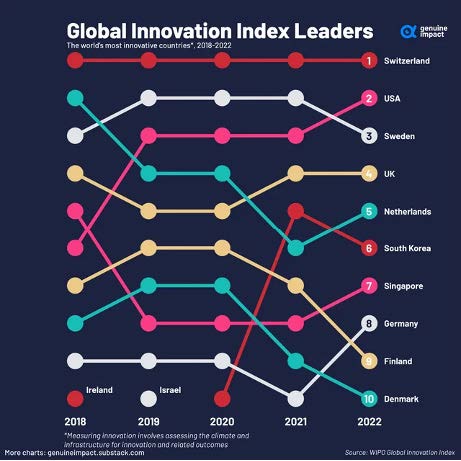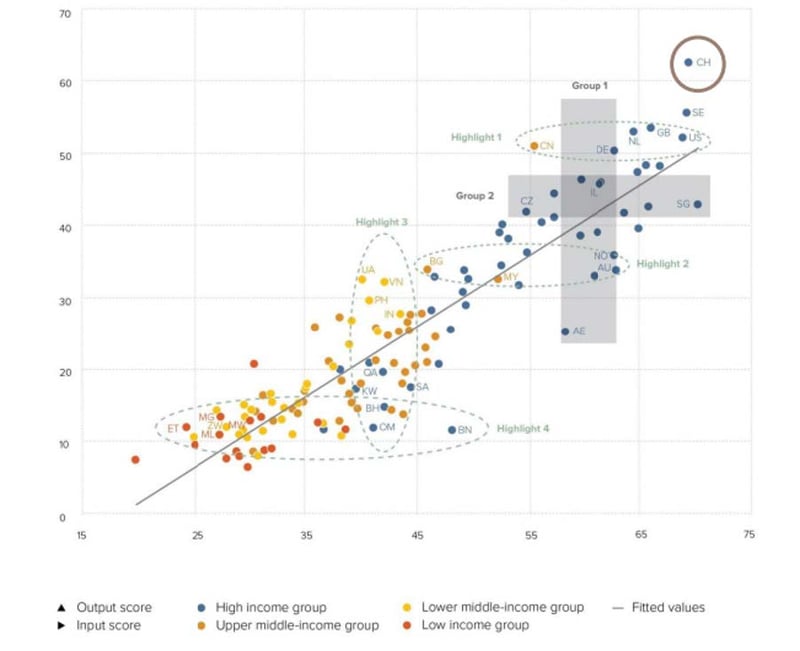The GII, an annual ranking comprising of approximately 132 countries, assesses and ranks economies based on their innovation capabilities and outcomes. Published annually by the World Intellectual Property Organization (WIPO) headquartered in Geneva, the GII meticulously evaluates various indicators related to innovation such as research and development (R&D) investment, business sophistication, education, infrastructure, and market sophistication. The uninterrupted reign of Switzerland as the top innovative country comes from several factors encompassing a dynamic education system, political stability, robust investments in R&D, as well as a thriving Fintech and Biotech ecosystem.
Switzerland is top in the world when it comes to innovation
For an impressive 12th consecutive year, Switzerland continues to be the world's top innovative economy, holding the number one spot on the Global Innovation Index (GII). Following closely behind are the United States, Sweden, the United Kingdom, and the Netherlands in the GII rankings.
WIPO, a specialized agency of the United Nations measures innovation in its GII study based on 80 criteria and encompasses two pivotal sub-indices: The Innovation Input Sub-Index and the Innovation Output Sub-Index. The Innovation Input Sub-Index evaluates critical factors such as institutional support, human capital and research, infrastructure quality, market sophistication, and business sophistication. Meanwhile, the Innovation Output Sub-Index examines knowledge and technology outputs, encompassing patents, technology transfer, and high-tech manufacturing, along with creative outputs, including creative goods and services, online creativity, and intangible assets.
The relationship between innovation inputs and outputs is a critical aspect of evaluating a nation's innovative capacity. This relationship is often visualized on a graph, where innovation inputs, are plotted on the horizontal axis, and innovation outputs, are plotted on the vertical axis. Economies that fall above the line on this graph are considered efficient in translating their innovation investments into valuable and impactful outputs. In simpler terms, they are making the most out of their investments in innovation. Switzerland exemplifies this efficiency, consistently positioning itself above the line.

According to WIPO, despite its size and population, Switzerland consistently outperforms in technology investment and inventions, securing the foremost position globally for "knowledge and technology output and creative output", producing the fourth most patents per capita in the world. WIPO also observed that amidst ongoing financial uncertainties on a global scale, the landscape of global innovation has experienced renewed growth, particularly within the health, energy, and artificial intelligence domains. Investments in scientific progress, publications, research, and development, as well as emerging enterprises,
grew substantially throughout 2022, despite prevailing global instabilities stemming from the war in Ukraine, the repercussions of the COVID-19 pandemic, and subsequent inflationary pressures.

The secrets behind Switzerland’s success
There is no magic behind Switzerland's success; several factors drive its innovation dominance.
1. Switzerland’s education system
Switzerland disposes of a well-structured education system meticulously designed to foster innovation. It operates effectively, guided by central principles while allowing cantons to govern specific aspects, ensuring adaptability to local regions and contexts. Switzerland secured the top position in university education, as validated by the latest QS World University Rankings (2023). Notably cost-effective, a striking 15% of Swiss university programmes rank within the global top ten across 54 academic disciplines. Noteworthy institutions such as the Swiss Federal Institute of Technology Zurich (ETH) excel in various domains including Earth Sciences, Architecture (Third place), Engineering – Mechanical, Aeronautical and Manufacturing (fifth place), and Math, Physics, and Astronomy (all eighth place). The Swiss Federal Institute of Technology Lausanne (EPFL) has also achieved a top-ten global ranking in two subjects: Data Science (9) and Civil Engineering (10). Switzerland also excels in fields such as Hospitality Management, with EHL Hospitality Business School leading the way, along with expertise in dentistry and other disciplines.
Additionally, Swiss higher education is recognized for
its practical, pragmatic, industry-centric approach. This orientation is pivotal in developing a highly skilled labour force, facilitating the seamless progression of concepts and patents to tangible, industrialized products.
2. Switzerland’s stable and neutral political system
Switzerland is consistently ranked as one of the most politically stable and low-risk nations globally. The US News and World Report ranks Switzerland in the fourth position in its 2023 global ranking of Most Politically Stable countries. This is attributed to the concordance, direct democracy, and robust rule of law of the Alpine nation. Switzerland has a political system that “guarantees productive stability and allows the Swiss economy to thrive,” as Seedstars explains in its 2019 report. The decentralized governance and strong tradition of direct democracy create an environment favorable for innovation. Switzerland's federal structure, distributing powers to cantons, encourages regional competition and experimentation, fostering tailored innovative approaches. In the 2020 study titled "Power Up Switzerland," Deloitte conducted an analysis of the key values and political institutions that render Switzerland an attractive business destination. The study concludes that, across all industries, future competitiveness and innovation primarily rely on the country's political stability. Switzerland's consistent political stability attracts both investors and skilled individuals. Historically, this stability and neutral positioning has provided a haven for those forced to leave their own countries due to wars or persecution, with notable figures such as Albert Einstein among them. Today, academic circles and multinational corporations operating within the nation also benefit from a significant presence of foreign talent. Switzerland, for the 10th consecutive year, has secured the top position in the 2023 IMD World Talent Ranking, surpassing 64 economies across eight regions. The proportion of foreign workers in the Swiss workforce accounts for approximately one-third of the total workforce as of 2022. This consistent influx of expertise emphasizes the pivotal role of political stability in creating an environment conducive to innovation and economic progress.
3. Switzerland’s R&D investments
Switzerland's innovation dominance is strongly underpinned by substantial investments in R&D. In 2022, corporate investment in R&D witnessed a notable upswing, surging by +14 percent year on year to reach 33 billion euros, ranking in fifth place worldwide, as outlined by EY. Pharmaceutical giants Roche and Novartis, headquartered in Basel, rank among the top 20 global companies with the largest research budgets, further fueling Switzerland's innovation landscape, according to WIPO. The country also boasts the highest ratio of European patent applications to its population. Generous government support from both federal and local governments is part of the equation. According to Lan Zuo Gillet, the programme director for Entrepreneurship Training in Western Switzerland, the approach to R&D is notably bottom-up.
“The government doesn’t dictate where it thinks investment should be made. Instead, it invites individuals with innovative ideas to come forward, and backs those it considers to be the best and potentially most impactful. In this way the initiatives come from the people, not the government”, Lan says.
Moreover, the funding mechanism strategically encourages collaboration between the corporate sector and universities. Innosuisse, the Swiss Innovation Agency, channels funds directly to universities, incentivizing companies to partner with academic institutions for the development of new products and innovations. This collaborative approach not only facilitates subsidized research support for companies but also ensures research departments stay engaged with the evolving markets and the broader economy.
4. Switzerland’s Fintech & Biotech clusters
Switzerland's innovation dominance, reflected in the GII rankings, is further fueled by its thriving Fintech cluster. The rapid digitalization within the banking and financial sectors has created a robust innovation ecosystem. The Swiss government plays a significant role in streamlining the startup process and reducing bureaucratic obstacles, positioning Switzerland as a preferred location for Fintech enterprises. Around 10% of all European Fintech businesses are based in Switzerland, primarily concentrated in Zurich. The most developed Fintech segment is within the crypto and blockchain industry and 7.3% of all Swiss FinTech companies strategically focus on sustainable products and services, as of 2022. Additionally, Switzerland's innovation scene is significantly boosted by its thriving biotech cluster. Recognized widely as a top biotech hub, Switzerland hosts pharmaceutical giants like Novartis and Roche, as well as a vibrant ecosystem
of innovative startups and research institutions at the forefront of biotechnological advancements. In 2022, the Swiss biotech sector saw impressive growth, with revenues reaching CHF 6.8 billion and R&D investments at CHF 2.7 billion. Recent research by IQVIA in the 2023 Swiss Biotech Report reveals a notable trend: Switzerland now hosts 20% of European biotech companies. Many of these, including entrants from the US, prefer strategic Swiss locations like Basel, Geneva, Zurich, or Lucerne. Their preference for Switzerland as a Biotech hub is partially attributed to the high approval rates by Swissmedic, further underlining the nation's appeal as a conducive hub for biotech advancements.
Conclusion
Switzerland's unparalleled 13-year streak as the world's innovation leader, highlighted by its top ranking in the Global Innovation Index GII, emanates from a combination of factors. Switzerland's robust education system, stable political environment, substantial investments in research and development, thriving Fintech and biotech clusters, and a culture fostering collaboration and entrepreneurship all converge to solidify its position as a guiding light of innovation in the modern world.
Disclaimer
This marketing document has been issued by Bank Syz Ltd. It is not intended for distribution to, publication, provision or use by individuals or legal entities that are citizens of or reside in a state, country or jurisdiction in which applicable laws and regulations prohibit its distribution, publication, provision or use. It is not directed to any person or entity to whom it would be illegal to send such marketing material. This document is intended for informational purposes only and should not be construed as an offer, solicitation or recommendation for the subscription, purchase, sale or safekeeping of any security or financial instrument or for the engagement in any other transaction, as the provision of any investment advice or service, or as a contractual document. Nothing in this document constitutes an investment, legal, tax or accounting advice or a representation that any investment or strategy is suitable or appropriate for an investor's particular and individual circumstances, nor does it constitute a personalized investment advice for any investor. This document reflects the information, opinions and comments of Bank Syz Ltd. as of the date of its publication, which are subject to change without notice. The opinions and comments of the authors in this document reflect their current views and may not coincide with those of other Syz Group entities or third parties, which may have reached different conclusions. The market valuations, terms and calculations contained herein are estimates only. The information provided comes from sources deemed reliable, but Bank Syz Ltd. does not guarantee its completeness, accuracy, reliability and actuality. Past performance gives no indication of nor guarantees current or future results. Bank Syz Ltd. accepts no liability for any loss arising from the use of this document.
Related Articles
The iShares Expanded Tech-Software ETF (IGV), treated as the benchmark for the sector, has slid almost 30% from its September peak, a sharp reversal for what was considered one of the market’s safest growth franchises. Every technological cycle produces its moment of doubt. For software, that moment may be now.
Nuclear power is getting a second life, but not in the form most people imagine. Instead of massive concrete giants, the future may come from compact reactors built in factories and shipped like industrial equipment. As global energy demand surges and grids strain under new pressures, small modular reactors are suddenly at the centre of the conversation.
Cosmo Pharmaceuticals’ successful Phase III trials in male hair loss has drawn attention to a market long seen as cosmetic. Growing demand for effective treatments has accelerated research and encouraged the rise of biotechnology companies exploring new approaches.



.png)